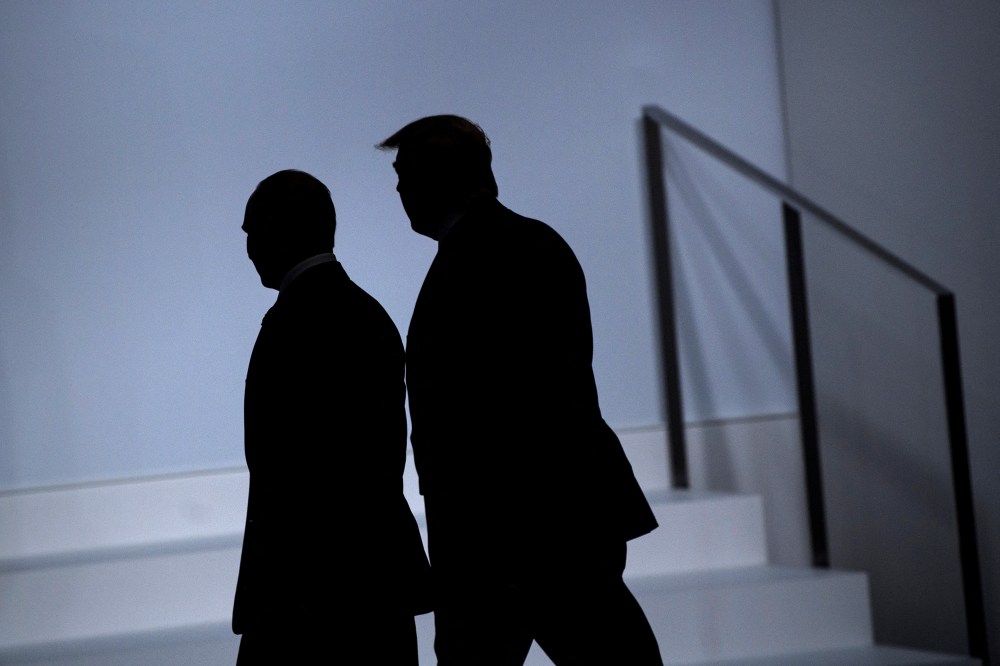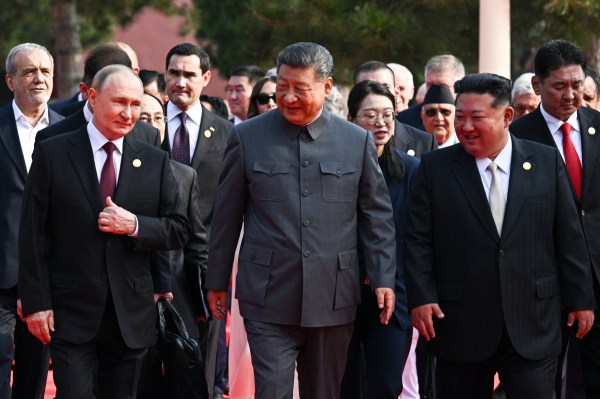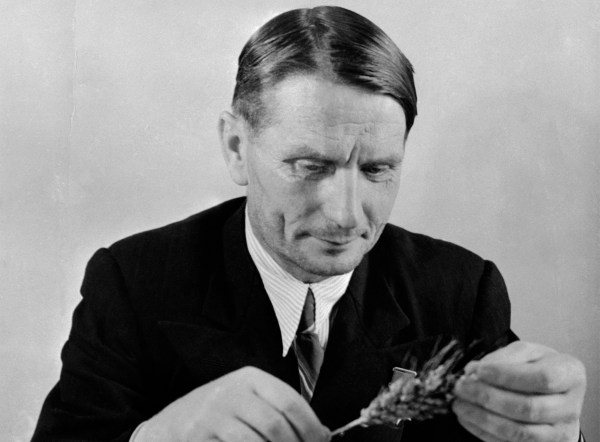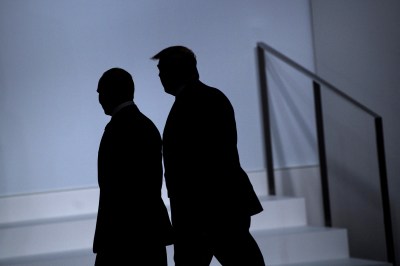Being crazy has its advantages.
Or rather, appearing to be crazy does. That’s what Richard Nixon thought when he based his strategic approach to Vietnam on “the madman theory” of foreign relations. By convincing America’s communist enemies that he was nutty enough to push the button if provoked, Nixon surmised, he might frighten them into suing for peace.
You know how Russia has casually hinted at nuking Ukraine every few months for the last three years? That’s the madman theory at work. It’s an attempt to deter an adversary by stoking uncertainty about whether you’re still basically rational or not.
The madman theory isn’t very effective, as you may have noticed from the outcome in Vietnam and the current state of play in Ukraine. At some point, you need to actually do the crazy thing you’ve threatened to do, or the enemy will conclude that you’re bluffing.
Even so, strongmen love it because it validates their instinct to get their way by intimidating others. You can’t ask for a better example than what Donald Trump told the Wall Street Journal last October about using military force to end a Chinese blockade of Taiwan. “I wouldn’t have to,” said the soon-to-be president, “because [Xi] respects me and he knows I’m f—ing crazy.”
“He knows I’m f—ing crazy” is the madman theory of deterrence distilled to its essence. Ask any Trump supporter how an isolationist like the president, committed as he is to “ending endless wars,” proposes to halt Chinese and Russian expansionism, and they’ll give you some variation of it. America’s enemies won’t dare test him, they’ll say, because he’s f—ing crazy.
No argument there. “He’s f—ing crazy” is also the thesis of my daily newsletter distilled to its essence. But let’s be real: Trump isn’t as f—ing crazy as he’d like everyone to think, at least when it comes to foreign policy.
Will Saletan has a piece today at The Bulwark tracking four pitiful months of the president trying and utterly failing to persuade his friend Vladimir to stand down in Ukraine. Trump has claimed many times that the war never would have started in 2022 if he were in charge rather than the “weak” Joe Biden, but that argument looks feebler by the day as Russia goes on ignoring his demands for a ceasefire. Recently, he was reduced to claiming that we’ll know “in two weeks” whether Putin wants to end the war, which is classic Trump-speak for “I have no idea.”
It’s another loss for the madman theory, inspiring Saletan to title his article “The myth of Trumpian deterrence.” Except … it’s not entirely a myth, is it?
It’s mostly a myth. Since returning to office, President Madman has failed to prevent two nuclear powers from shooting at each other, failed to prevent China from menacing Taiwan last month, failed to prevent Houthi attacks on Israel and international shipping, and failed to prevent Israel itself from resuming its offensive in Gaza. About the only thing he’s successfully prevented is, er, the destruction of Iran’s nuclear program. There just ain’t much Trumpian deterrence happening overseas.
But domestically? Hoo boy. Feast your eyes on this.
Being “f—ing crazy” is working for the president like gangbusters, it seems, in convincing immigrants not to try their luck at the border. Trumpian deterrence sure isn’t a myth in that respect.
Why is the madman theory successful here at home and not very successful abroad? It’s because, for several reasons, Trump’s threats of behaving like a madman are much more credible domestically than they are internationally.
Pit bulls and ‘chihuahuas.’
A report today from Axios contains a revealing quote about how the White House views Ukraine.
The president apparently found Sunday’s spectacular sneak attack on Russian bombers to be “pretty strong” and “badass.” (When he’s right, he’s right.) Said one Trump adviser, “From an international perspective, you’ve got a chihuahua inflicting some real damage on a much bigger dog.”
“Chihuahua”? Ukraine isn’t a chihuahua. Through hard experience and sheer necessity, it now fields one of the world’s most formidable armies. But it doesn’t surprise me that this administration would continue to treat it as a pipsqueak: Postliberals divide the world between “strong” and “weak,” and Russia is the very model of how they understand national strength—ruthless, militaristic, imperialist in its sphere of influence, unapologetically authoritarian.
Locked in conflict with a quintessentially “strong” nation, Ukraine can only seem feeble by comparison. The belief among right-wing populists that it stands no chance against Putin, that it doesn’t have the cards, will remain deathless for that reason. The strong do what they can and the weak suffer what they must, as Thucydides put it; not only can’t the weak win, they don’t deserve to. That’s the MAGA way.
And that’s why the president is a more effective “madman” domestically than internationally. In one case, he’s dealing with what he perceives to be chihuahuas. In the other, pit bulls.
Immigrants to the United States don’t have the cards. Trump can bar them from entering, oust them for saying the wrong thing, and potentially even dump them in a war zone in a country they’ve never been to. When he suspended due process for illegal immigrants suspected of being gang members and exiled them to an El Salvadoran dungeon, that was him demonstrating that he really will do the crazy thing that political madmen are forever threatening to do.
Like any bully, he’s not just willing to confront pipsqueaks, he’s eager to. Would-be immigrants seem to have grasped that and concluded that it’s best to stay off the playground while he’s president, not knowing what sort of banana-republic treatment they might receive if they cross the border and end up detained.
Overseas, on the other hand, the madman isn’t so mad. He’ll be aggressive with nations he regards as chihuahuas—Canada or Greenland, for instance—but when faced with a pit bull, he becomes the picture of diplomatic patience and de-escalation. He doesn’t want to sanction Russia because Russia might shrug and fight on; he doesn’t want to go nuclear with tariffs on China because the U.S. economy might buckle before China does. A bully won’t risk losing face by escalating with an opponent who’s formidable enough to potentially make him look weak. He’ll always look for ways to smooth things over before a brawl breaks out.
The weak get deterrence, and the strong get deals. That’s Trump’s modified version of “the madman theory,” and it’s why his domestic adversaries will always get the iron fist while his foreign ones get handshakes.
The core of his base.
Two unusual facets of Trump’s political support make it easy for him to behave like a madman toward immigrants and other domestic enemies.
One is the cultish loyalty of his base and the cowardly obedience it incentivizes among Republicans in Congress. I won’t belabor a point I’ve made many times, but in 2025, the president can do anything—literally just about anything—and suffer no meaningful political consequences for it. There’s no malfeasance he might commit that’s so terrible that Republican voters would favor removing him from office because of it.
He’s taking bribes in broad daylight, for cripes’ sake.
A president who won’t be held accountable for his abuses will commit them brazenly, especially with respect to immigration in Trump’s case. The ideological breadth of the American right (and a chunk of the American middle) is behind him in cracking down on border security, and he knows it. It’s one of the issues that won him reelection, and he knows that, too. Even at the height of media coverage about the Kafkaesque ordeal of Kilmar Abrego Garcia, the immigrant who was renditioned to El Salvador in violation of a court order, just 14 percent of Republicans thought Garcia should be returned to the United States for further adjudication.
The cultishness of Trump’s base is an important weapon for him. He can fight to a draw, or near-draw, in public opinion in virtually any political dispute, no matter how f—ing crazy his behavior is. So why not be crazy?
Things don’t work that way overseas. Russia can make trouble for him by spoiling the nuclear deal with Iran that he’s set his heart on. China can potentially wreck his presidency by leaning into the trade war he started, risking a global recession and accelerating the “sell America” trend we saw in April. War could break out if he pushes either too hard. The United States can and will be held accountable abroad for how Trump behaves. Pulling the madman shtick diplomatically could cost him in a way that his more insane domestic initiatives never would.
In fact, the most effective international use of “the madman theory” during his second term has victimized America’s allies, not its enemies. The president’s volatility and moon eyes for Russia have freaked out so many U.S. partners that news of Germany’s rearmament after 80 years of quiescence is being celebrated in Europe. In four months, the main deterrence achieved by the madman in the White House has been deterring the Pax Americana from existing.
Which brings us to the other salient fact about Trump’s base: It’s divided over foreign policy in a way that it isn’t over domestic policy.
Yeah, yeah, I know—diehard fiscal hawks are grumbling about the Big, Beautiful Bill. Never mind them. Rank-and-file Republicans don’t care about spending, certainly not when doing so would deprive their idol of the big legislative “win” he’s been seeking. Foreign relations are different, though: Look no further than the nasty little screed Tucker Carlson posted on Wednesday night, calling radio host Mark Levin a chickenhawk for lobbying Trump to get rough with Iran. Name-brand populists don’t usually brawl publicly over policy. This is a notable exception.
Postliberals made inroads in convincing the grassroots right to question its beliefs about who should and shouldn’t be allies of the United States, but they haven’t yet vanquished the old-school hawks, especially on questions like the Iranian threat to Israel. Trump is caught in between, needing to project “toughness” for Reaganites and an aversion to “pointless wars” for the Tuckers, J.D. Vances, and Tulsi Gabbards of his coalition. Being beholden to an ascendant isolationist wing of his movement means the madman can’t behave as madly abroad as he might prefer.
And Vladimir Putin understands that, which is why those ceasefire demands go in one ear and right out the other.
Deals, deals, deals.
We all understand that the president is “transactional” and forever looking for a deal, even when he can’t explain what the purpose of a particular deal might be. But I think we underestimate how much of his tender ego rests on his image as some sort of master dealmaker.
He created that image for himself in his first book. He chattered excitedly about it in Republican primary debates in 2016. The idea that he’s able to strike deals that no one else can strike is a narcissistic twofer for him: It must mean that he’s possessed of both extreme charm and extreme “toughness.”
There are no deals for the president to strike with illegal immigrants. There’s no one to negotiate with. The only way he “wins” is by keeping his promise to stop them from entering and to deport those who are already here en masse. That calls for deterrence, and deterrence calls for madman behavior.
Foreign policy is different. I think it pleases him to no end to strike bargains with the world’s most powerful leaders, and the more menacing they are, the more pleasing it is. It’s not just a matter of him gaining concrete diplomatic concessions, as he did with the Abraham Accords. It’s a matter of him proving that he’s such a skilled negotiator that he can bring ruthless killers—Putin, Xi, his old boyfriend Kim Jong Un—to the table to chat with him amiably.
Those are exactly the sort of miscreants to whom “the madman theory” logically should be applied in hopes of scaring them into cooperating with America. But Trump can’t seem to get past his thirst for deals—so much so that he becomes the opposite of a madman when dealing with them. He’s endlessly patient, apparently afraid that if he gets too confrontational, they’ll stop talking to him.
And they know it.
Last week, a reporter asked the president why he hasn’t followed through yet with sanctions on Russia. “If I think I’m close to getting a deal,” he said. “I don’t want to screw it up by doing that.” On Thursday, following a phone call with Moscow, he proudly announced that Putin had offered to participate in nuclear negotiations with Iran and “could, perhaps, be helpful” in brokering an agreement. Within hours, Iranian media was reporting that Russia’s president would soon visit the country.
In other words, not only is Putin stringing Trump along with empty promises of a Ukraine deal, he’s joining Iran’s effort to string Trump along with empty promises of a nuclear deal. And it’s working for him: Yesterday, evidently pleased by the gesture, the president asked Senate Republicans to delay their new bill imposing sanctions on Russia.
Around the same time on Wednesday, CNN reported that he’s spent weeks trying to get China’s leader on the phone to discuss trade, to no avail. (They finally connected on Thursday morning.) “Trump views his relationship with Xi through a personal lens, harkening back to their interactions during his first term,” the outlet reported, which is as silly as it is believable. Once again, the president seems to imagine that only his magical personal touch can produce a major diplomatic breakthrough—and the Chinese, realizing that, have kept him on the hook by playing hard to get.
Like Russia, they’re stringing him along in his desperation for a deal. And like Russia, they’re getting something out of doing so.
This is why it’s so hard to believe that Trump would ever act militarily in defense of Taiwan. It’s not just that he fears defeat or a political backlash from the “America First” cohort of the right, although both of those things are true. It’s that he’ll never believe he can’t swing a deal that will somehow avert war until the People’s Liberation Army is in Taipei.
“The madman theory” doesn’t work once everyone realizes that the madman is bluffing.
Upside down.
The irony of all this is that Trump has it backward. “The madman theory” should be directed mainly at foreign adversaries, not domestic ones.
That’s not just a matter of morality, although it’s partly that. You don’t need to love illegal immigrants to believe that they should be treated more respectfully than the thug-in-chief of Russia’s barbarian horde. It’s also a matter of strategic logic: “The madman theory” is all about creating uncertainty, and uncertainty at home does more harm than uncertainty abroad does.
Take the president’s tariffs, which are nominally imposed on foreign countries but amount to a tax on Americans. It’s fine to keep Xi guessing about how crazy the commander-in-chief might be, but it’s legitimately crazy to paralyze U.S. businesses by changing the price of major manufacturing components drastically on a whim. It’s defensible to leave Putin guessing about sanctions, but it’s self-sabotage to leave talented foreign students guessing about whether they’ll be harassed or not if they come to the United States to study.
Good policy is a combination of carrot and stick. Trump’s administration is all stick at home and all carrot overseas. For his domestic enemies, it’s nothing but sh-t sandwiches, and for his foreign ones, it’s nothing but TACOs. He needs a more diverse menu.







Please note that we at The Dispatch hold ourselves, our work, and our commenters to a higher standard than other places on the internet. We welcome comments that foster genuine debate or discussion—including comments critical of us or our work—but responses that include ad hominem attacks on fellow Dispatch members or are intended to stoke fear and anger may be moderated.
With your membership, you only have the ability to comment on The Morning Dispatch articles. Consider upgrading to join the conversation everywhere.